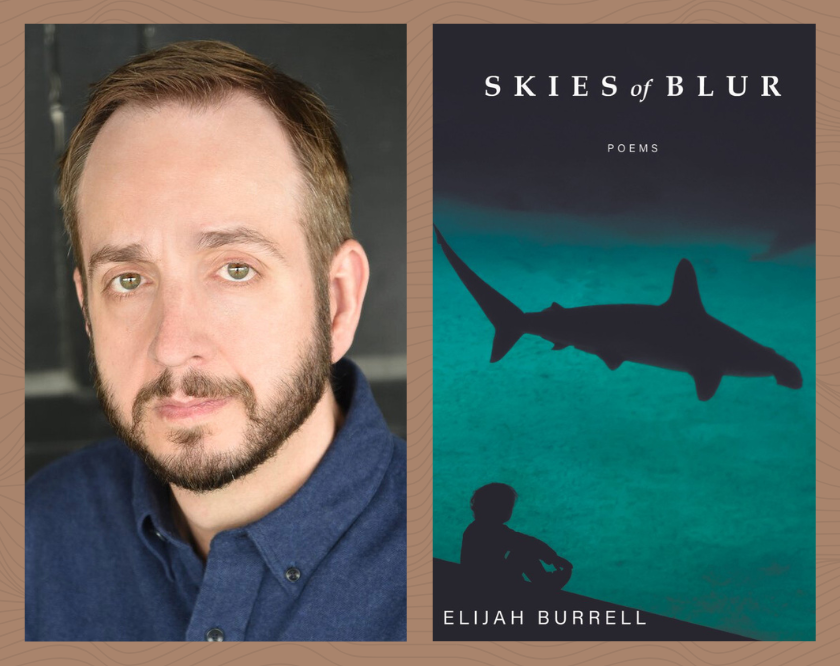Elijah Burrell is a Mid-Missouri author whose latest book is “.” It’s a book of poems that navigate the depths of human connection and disconnection, love and loss, and the spaces between. Burrell is the author of two other collections of poetry and his writing has appeared in many various publications. He is part of the faculty of Lincoln University, where he serves as a Professor of English. He was kind enough to take the time to be interviewed via email.
Daniel Boone Regional Library: Is there any story behind the title of this collection? Since you wrote many of the poems during the pandemic, did that play into it somehow?
Elijah Burrell: I think I was listening to music on shuffle, and Louis Armstrong’s “What a Wonderful World” must have been playing. There’s the famous line: “I see skies of blue and clouds of white / The bright blessed days, the dark sacred nights,” and that called out to me. It’s a beautiful song, of course, but I’ve always associated it — ironically — with a sort of heaviness. I’m sure that has to do with the tempo of the song, the resignation in his voice, and the way it’s often juxtaposed in film as a soundtrack to violence and mayhem. “Skies of blue” has always meant a bright, clear day, and — yes — during the pandemic, nothing seemed clear. Everything kind of blurred together in a glaze of anxiety and loneliness. “Skies of Blur” felt like the perfect title to encapsulate the feeling of an imperfect time.
DBRL: In “Never Say Love in a Poem” you playfully explore the creative advice of avoiding the word “love” when creating art & poetry. What do you think about creative constraints like this in writing poetry? Do you see them as generally beneficial or do you find them too restrictive?
Burrell: I don’t necessarily see that advice as a constraint. Donald Hall once said, “Good poetry is the perfect machine of language,” and I try to operate that machine and keep it maintained. I pass this on to my students and encourage them to consider using images over abstractions. I learned this from the poets who taught me — that images embody feelings in ways explanations rarely can. That said, I do — of course — use the word love in my own writing.
DBRL: I noticed that there are some middle-age concerns throughout this collection. (One poem is even titled “Midlife.”) Is writing poetry at this time in your life easier than it used to be or has it become harder as you’ve gotten older?
Burrell: This is a tremendous question, and one to really ponder. For me, making art is a strategy for survival. I know that might sound a little too earnest, but it’s true. Writing — and teaching writing at the university — helps quicken my mind. Writing a poem often allows me to feel surprise when a semester becomes fairly routine and orderly. Writing often jolts me off the rails and into the wild forests of my mind. I value that, so it’s probably art that makes this season of life easier — not the other way around.
DBRL: The poem “This is that song by Alex Chilton (“Thirteen”)” examines a 1997 performance by Elliott Smith where he plays a cover of the 1974 song “Thirteen” by Chilton’s band Big Star. Can you give us some background about how this poem came together? How did you come across this performance? Chilton has a small Mid-Missouri connection — did that influence you in some way?
Burrell: The simple answer is that the poem came together — first and foremost — from my love for Alex Chilton, Big Star, Columbia, music made in Memphis, and, of course, Elliott Smith. Chilton’s affinity for visiting and playing in Columbia is well-documented, and since we’ve documented my own age in a roundabout way, he was doing that when I was discovering his music as a young man. Fast-forward a few years, and Elliott Smith’s lyrics, vocals, and musicianship reached me in ways many of the second-rate, less melodic grunge bands dominating the radio at the time hadn’t. I know a lot about both of their lives and how they were cut short far too early. In the case of “Thirteen,” it’s just about a perfect pop tune. One evening, I got sucked down a rabbit hole on YouTube, watching bootleg live shows from the nineties. The poem that came from this experience centered around the May 1997 show where Smith is playing an intimate set for a quiet audience at a record shop called Stinkweeds in Phoenix, Arizona. The poem is about the performance of a brilliant artist before they became relatively famous — and about the inexplicable human capacity for apathy in the presence of greatness.
DBRL: I was surprised at how many journals published these poems first before this collection. Do you set goals to write and submit to journals on a regular basis, or is it a more laid-back process of writing and submitting when opportunities come your way?
Burrell: Finding good, new homes for poems in magazines and journals before they’re published in a collection is important, but not always explicitly required. Some book publishers are looking to discover completely pristine work — and emerging writers who might not have had the opportunity to publish elsewhere beforehand. On the other hand, I’ve found that most publishers prefer a significant portion of poems in an unpublished manuscript to have appeared in reputable journals before they take a serious look at the collection. Most poets do not have an agent or any other form of representation, so previous validation in well-known magazines can be a solid foot in the door. Part of my process — which includes a fair amount of rejection — is the ritual submission I undertake throughout the business of putting a manuscript together. This is important for poets to consider as they write, because I think a good number of young writers might be too shy to submit their work — or simply unaware they should.
DBRL: Read anything good lately you’d like to recommend?
Burrell: So many things! Some poetry collections I’ve recently enjoyed include Leona Sevick’s “The Bamboo Wife,” “Dirt Songs” by Kari Gunter-Seymour, “Lady Smith” by Jess Smith, “origin story” by Gary Jackson, “Tamp” by Denton Loving, and “When I Waked, I Cried to Dream Again” by A. Van Jordan.
DBRL: Where can readers get a copy of your book?
Burrell: You can find “Skies of Blur” wherever you love to buy books. If it’s not on the shelf, just ask them to order it for you! If you’re buying locally in Columbia, MO, be sure to visit Skylark Bookshop or Yellow Dog Bookshop. You can also find the usual online links here: https://eastoverpress.com/book/skies-of-blur-by-elijah-burrell




